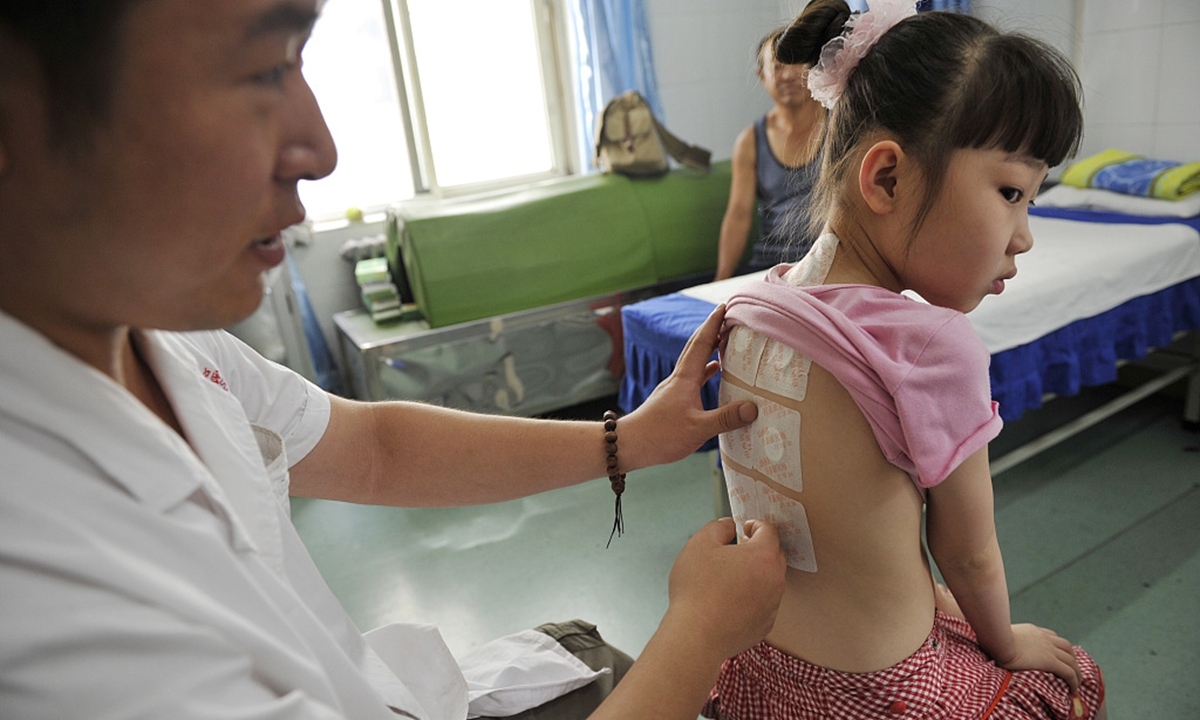As the sultry winds of summer sweep across China, the country enters a period known as the "dog days" of summer, or
Sanfu on Monday. This is the hottest and most humid time of the year, a period that has captured the attention of social media with trending hashtags such as "how to be healthy during the dog days of summer" and "how to lose weight during
Sanfu."

A girl in the middle of Sanfutie treatment Photo:VCG
But what exactly is
Sanfu, and how do the Chinese approach health and wellness during this sweltering season?
Sanfu, literally meaning "three
fu," a term that encapsulates the essence of the peak summer heat in China, typically spanning from mid-July to mid-August. It is divided into three phases:
Toufu (the first 10 days),
Zhongfu (the following 20 days), and
Mofu (the final 10 days), totaling an extended 40 days of intense heat.
The "
fu" in
Sanfu signifies a time of hiding or lurking, reflecting the ancient Chinese belief in the delicate balance of yin and yang energies. During this period, yang energy is believed to reach its zenith, making the body's yin energy particularly vulnerable and susceptible to health issues such as fatigue, irritability, and heatstroke.
In China, these days are not only a time of intense heat but also a period rich with traditional practices and beliefs, especially in the realm of traditional Chinese medicine (TCM).
TCM, with its deep historical roots, plays a pivotal role in the Chinese approach to health during the
Sanfu days. It advocates for practices that align with the natural rhythms of the seasons, emphasizing the importance of maintaining health through harmony with the environment.
TCM practitioners recommend specific practices to counteract the excess heat and protect the body's yin energy, such as
Sanfutie, a medicinal patch applied to the skin to treat ailments like coughs, asthma, and arthritis. The belief is that these patches, when applied during the hottest days, can help restore the balance of yin and yang within the body.
To prevent illness and maintain health during
Sanfu, TCM encourages a series of lifestyle adjustments. These include avoiding direct sun exposure during the peak heat of the day, staying well-hydrated, and engaging in gentle exercises like tai chi and
qigong (Chinese breathing exercise) to promote the circulation of blood without overheating the body.
Additionally, certain foods are consumed to replenish nutrients lost through sweating, such as dumplings, noodles, and baked pancakes with fried eggs.
Foods like watermelon and cucumber are also favored for their cooling properties.
Many young Chinese like to do more exercise during this period, hoping to lose some weight.
Indeed, the high temperatures and humidity of
Sanfu present a unique opportunity for weight loss, particularly for two types of individuals: those with a "spleen deficiency and dampness obstruction" constitution, who may have poor appetites yet struggle with weight gain, and those with a "spleen and kidney yang deficiency" constitution, characterized by obesity, fatigue, and cold extremities.
TCM treatments such as acupuncture and moxibustion are used to regulate the spleen and stomach functions, improve gastrointestinal health, and adjust the circulation of blood.
There are several misconceptions about maintaining health during
Sanfu. Over-exercising, for instance, is not recommended; instead, light activities like walking, yoga, or tai chi are preferred to avoid overheating. Drinking large amounts of mung bean soup, which is cooling, can harm the spleen and stomach if consumed excessively. Additionally, replacing meals with fruit and vegetables can lead to a weakened immune system and potential health issues; it's important to maintain a balanced diet that includes meat, fish, beans, dairy, and eggs, even in the heat.
In summary, by embracing ancient wisdom and making conscious lifestyle adjustments, Chinese people navigate the dog days of summer with a blend of traditional and modern awareness, ensuring health and well-being throughout the season.




